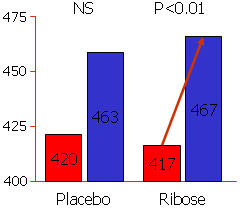Return to
Bioenergetic Support Page
Ribose in CHF
Regardless of the underlying cause, the condition of heart
failure is associated with dilation of the left ventricle and an increased
intraventricular filling pressure (because the heart is stiff, the blood
pressure within the heart will rise). These two forces strain the heart,
such that it needs to generate more ATP energy. Even if its oxygen supply
is normal, the heart often cannot make enough ATP to meets this increased
demand; its cellular
ATP content will be burned off in to ADP, AMP, and finally to adenosine, which leaves the cell to
be lost forever. The heart is in worse shape now, without the building
blocks from which to regenerate ATP, so it's functional status deteriorates
further. If ribose is supplied as a supplement, the failing heart should
be able to get back in to ATP production mode, such that its performance could
improve. This makes sense in theory - let's see if ribose will work in
patients with CHF:
Fifteen patients with NYHA Functional Class II-III heart failure
(symptoms with mild to moderate effort) on the basis of coronary disease with
prior heart attack, were evaluated before and after three weeks of treatment
with placebo or with ribose at a dose of 5 gm. three times a day. The
subjects were then crossed over to the opposite treatment regimen following a
one week wash out period. A double blind protocol was followed.
E Wave Deceleration Time
Left Atrial Volume


E wave deceleration time, an echo marker of diastolic function, improved.
In other words the heart was less stiff. The anatomic correlate was a
decrease in the size of the left atrium. If the left ventricle fills
better and is less stiff, then the blood pressure within the heart will fall,
the back pressure into the left atrium and the lungs will fall, and the left
atrium will decrease in size. If the back pressure in to the lungs falls,
we would expect that you would be able to do more, and that the quality of your
life would improve.
Quality of Life Score

 Physical Functioning Score
Physical Functioning Score
Neither quality of life or physical functioning improved significantly with
placebo therapy. With ribose supplementation, however, the subjects experienced a
significant improvement in functional status and overall quality of life.
In other words, they could do more, and their lives were more enjoyable. Ribose
did not produce any side-effects, a typical characteristic of nutritional
therapies.
If you have heart failure, supplementation with ribose makes
perfect sense. The starting dose is 5 gm. three times a day. The
only potential down side of ribose is a mild drop in blood sugar in diabetic
patients receiving insulin, an issue that is easy to address.
James C. Roberts MD FACC
1/01/07



 Physical Functioning Score
Physical Functioning Score